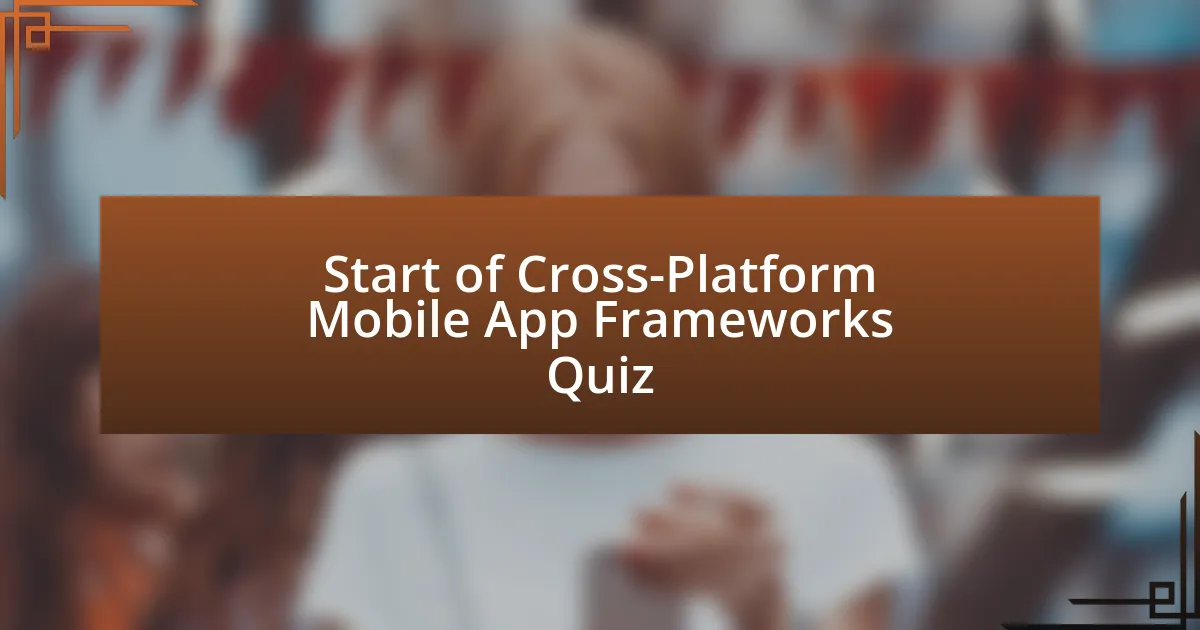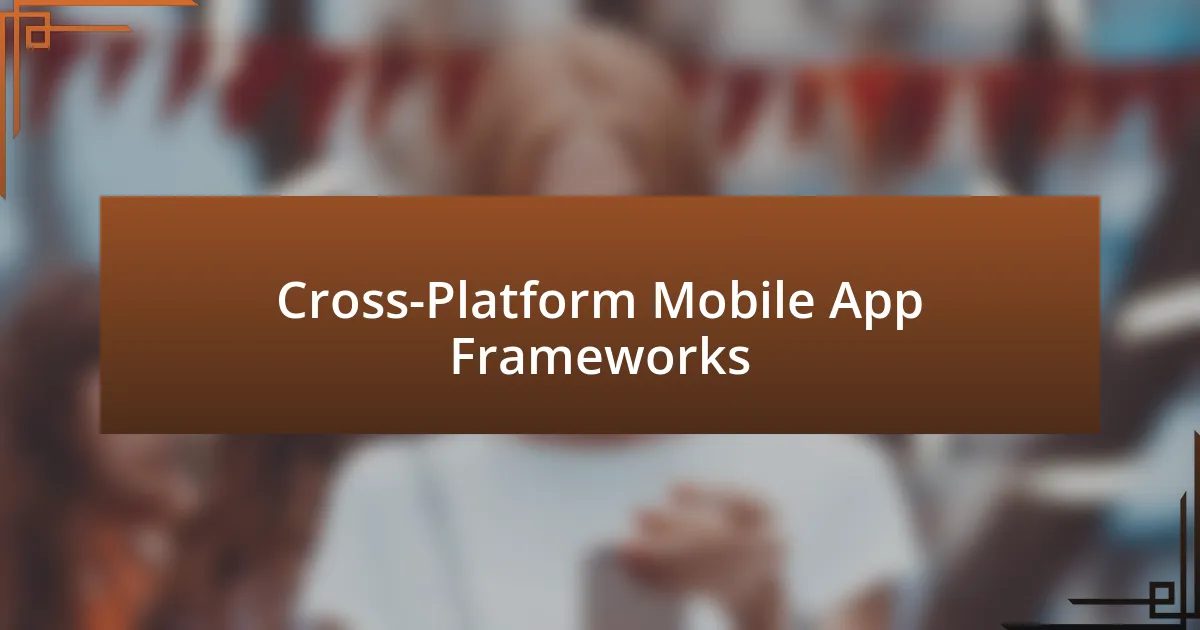
Cross-Platform Mobile App Frameworks Quiz

Start of Cross-Platform Mobile App Frameworks Quiz
1. What is cross-platform mobile app development?
- Cross-platform mobile app development is the process of building apps that are compatible with and can run on multiple operating systems, such as Android and iOS, using a single codebase.
- Cross-platform mobile app development focuses exclusively on desktop applications without considering mobile optimization.
- Cross-platform mobile app development is the method of developing mobile websites that mimic native app functions.
- Cross-platform mobile app development involves creating separate apps for each operating system to optimize user experience.
2. What are cross-platform frameworks?
- Cross-platform frameworks refer to libraries used solely for gaming applications on consoles.
- Cross-platform frameworks are tools used to build cross-platform apps, allowing developers to write code once and deploy it on multiple platforms.
- Cross-platform frameworks are platforms for running web servers on single operating systems.
- Cross-platform frameworks create applications that run exclusively on Windows systems.
3. Which are the top 5 cross-platform mobile app development frameworks in 2024?
- PhoneGap
- Cordova
- Sencha Ext JS
- Flutter
4. What is Flutter?
- Flutter is a mobile operating system developed by Google.
- Flutter is a web browser created by Google for mobile devices.
- Flutter is a game development engine for creating video games.
- Flutter is an open-source framework developed by Google for building cross-platform apps.
5. What is React Native?
- React Native is a server-side language for creating backend applications.
- React Native is a library for designing user interfaces for desktop applications.
- React Native is an open-source framework that allows developers to build cross-platform apps using React`s framework along with native platform capabilities.
- React Native is a website builder for creating online stores with ease.
6. What is Kotlin Multiplatform?
- Kotlin Multiplatform is an open-source technology for cross-platform mobile app development that allows sharing business logic and code across multiple platforms.
- Kotlin Multiplatform is a tool for testing web applications only on desktop browsers.
- Kotlin Multiplatform is a programming language specifically for writing iOS applications.
- Kotlin Multiplatform is a proprietary framework developed exclusively for Android apps.
7. What is Ionic?
- Ionic is a cloud storage service.
- Ionic is an open-source UI toolkit for mobile apps.
- Ionic is a programming language for databases.
- Ionic is a game development engine.
8. What is NativeScript?
- NativeScript is a web-based platform for building static websites only.
- NativeScript is an online service for creating mobile apps without coding knowledge.
- NativeScript is an open-source framework used to build native mobile apps on multiple platforms using JavaScript and TypeScript.
- NativeScript is a proprietary mobile OS developed by a single company.
9. Which framework is most commonly used for cross-platform app development?
- Sencha Ext JS
- Xamarin
- Flutter
- Ionic
10. What are the advantages of using Flutter for cross-platform app development?
- The advantages of using Flutter include a lack of support for animations, limited community resources, and dependency on native coding for all platforms.
- The advantages of using Flutter include a comprehensive set of widgets, native API access, and support for web applications only.
- The advantages of using Flutter include easy integration with Java only, using separate codebases for different platforms, and limited access to device features.
- The advantages of using Flutter include using the same UI and business logic for all platforms, similar native app performance, custom animated UI, and easy fast testing with the hot reload feature.
11. What are the advantages of using Ionic for cross-platform app development?
- Slower performance compared to native apps
- Easy customization of the app`s UI
- Requires separate code for each platform
- Limited access to device features
12. What are the advantages of using Cordova for cross-platform app development?
- Easy targeting of any platform, cost-effective technology, and using native resources to build an app.
- Requires separate codebases for each operating system, increasing workload.
- High dependency on third-party libraries for features and performance.
- Limited customization of user interface and appearance across platforms.
13. What are the advantages of using Xamarin for cross-platform app development?
- No integration with native device features
- Requires separate codebases for each platform
- Only usable for iOS app development
- Easy code sharing and access to native APIs
14. What is Qt?
- Qt is a web browser designed for developers.
- Qt is a game development engine used for consoles.
- Qt is a cross-platform framework for app development.
- Qt is a type of mobile operating system.
15. What are the advantages of using Qt for cross-platform app development?
- Access to limited components and plugins offered.
- No integrated debugger or pre-designed elements available.
- Quick development cycle, hot reload feature, and testing support.
- Guarantees 100% code compatibility with every platform.
16. What is Sencha Ext JS?
- Sencha Ext JS is a cross-platform app development framework that allows creating HTML5 applications for desktop computers, tablets, and mobile phones.
- Sencha Ext JS is a graphics design tool for creating 3D models.
- Sencha Ext JS is a video editing software designed for mobile devices.
- Sencha Ext JS is a database management system used for cloud storage.
17. What are the advantages of using Sencha Ext JS for cross-platform app development?
- Limited support for mobile devices
- Specialized tools for desktop apps only
- Comprehensive features for web-based applications
- Focusing only on Android development
18. What is PhoneGap?
- PhoneGap is a programming language for web apps.
- PhoneGap is a cloud service for hosting mobile apps.
- PhoneGap is a hardware platform for mobile devices.
- PhoneGap is a cross-platform framework for hybrid app development.
19. What are the advantages of using PhoneGap for cross-platform app development?
- Using existing web technologies
- Focuses solely on one operating system
- Requires unique coding for each platform
- Avoids utilizing native features
20. What is Framework7?
- Framework7 is a database management system used for backend development.
- Framework7 is a game development engine for creating cross-platform video games.
- Framework7 is a paid service for building only iOS apps using Swift.
- Framework7 is a free and open-source framework for developing mobile, desktop, and web apps with a native look and feel.
21. What are the advantages of using Framework7 for cross-platform app development?
- Complicated integration with other frameworks
- Requires extensive setup and learning
- Wide array of UI elements and widgets
- Limited to only one platform
22. What are the factors to consider when choosing a cross-platform mobile app development framework?
- App aesthetics, developer location, and customer reviews
- Device brand loyalty, company size, and licensing fees
- User interface complexity, marketing strategies, and budget
- Project requirements, performance needs, and community support
23. How does cross-platform app development reduce development time and costs?
- It requires separate code for each platform.
- It increases the time to develop for individual platforms.
- It uses different programming languages for each operating system.
- It allows developers to write code once and deploy on many platforms.
24. What is the significance of an active community in cross-platform app development frameworks?
- Increased development time
- Limited platform compatibility
- Better support and plugins
- Higher costs for app development
25. How does Flutter handle UI and business logic for cross-platform apps?
- Flutter uses a single codebase for both UI and business logic.
- Flutter separates UI and logic for each platform independently.
- Flutter requires different code for UI on web and mobile.
- Flutter uses third-party tools for managing app logic.
26. How does Ionic integrate with native APIs for cross-platform apps?
- Ionic uses a separate codebase for each platform, hindering native functionality.
- Ionic does not support any plugins and only works with front-end technologies.
- Ionic integrates with native APIs by providing tools and plugins for seamless integration.
- Ionic relies solely on web views, lacking direct integration with native APIs.
27. How does Cordova wrap HTML/JavaScript apps into a native container?
- Cordova converts HTML into Java binaries for apps.
- Cordova uses a web view to wrap HTML/JavaScript apps.
- Cordova relies on Java to compile apps into native code.
- Cordova runs JavaScript directly on the operating system kernel.
28. How does Xamarin extend .NET for cross-platform app development?
- Xamarin simplifies web development using only HTML and CSS.
- Xamarin allows .NET developers to build cross-platform apps with better native performance.
- Xamarin converts Java apps into .NET applications automatically.
- Xamarin restricts development to Windows applications exclusively.
29. What are the benefits of using Qt for cross-platform app development?
- Limited platform compatibility and high costs.
- Quick development cycle and testing support.
- Slower performance and fewer components available.
- Requires separate codebases for each platform.
30. How does Sencha Ext JS support data-intensive business applications?
- Sencha Ext JS offers tools for data visualization.
- Sencha Ext JS creates native mobile applications.
- Sencha Ext JS is used primarily for gaming applications.
- Sencha Ext JS allows offline app capabilities.

Quiz Completed Successfully!
Congratulations on completing the quiz on Cross-Platform Mobile App Frameworks! You’ve taken an important step toward understanding the tools and technologies that allow developers to create apps for multiple platforms. Throughout the quiz, you may have learned about key frameworks such as React Native, Flutter, and Xamarin. Each of these frameworks has its own unique features and advantages, which can impact your development process.
This quiz also highlighted the significance of cross-platform development in today’s mobile environment. The ability to write code once and deploy it across different operating systems saves time and resources. You now have a better grasp of how these frameworks can enhance productivity and drive innovation in mobile app development.
We invite you to delve deeper into this topic by checking the next section on our page. You’ll find valuable information that explains the intricacies of Cross-Platform Mobile App Frameworks in greater detail. Expanding your knowledge in this area can further equip you with the skills needed to navigate the evolving landscape of mobile app development.

Cross-Platform Mobile App Frameworks
Introduction to Cross-Platform Mobile App Frameworks
Cross-platform mobile app frameworks enable developers to create applications that run on multiple operating systems, such as iOS and Android, from a single codebase. This approach significantly reduces development time and cost. Developers can write code once and deploy it to different platforms, ensuring a consistent user experience across devices. Popular frameworks include React Native, Flutter, and Xamarin, each offering unique features and tools that facilitate cross-platform development.
Benefits of Using Cross-Platform Mobile App Frameworks
Using cross-platform frameworks offers several advantages. Developers save time since they can write a single codebase for multiple platforms. This encourages resource allocation efficiency, allowing teams to focus on enhancing app features rather than maintaining separate codebases. Additionally, cross-platform apps often have lower development and maintenance costs, making them a compelling choice for startups and businesses with budget constraints. Furthermore, consistent user experience enhances customer satisfaction.
Popular Cross-Platform Mobile App Frameworks
Some of the most popular cross-platform frameworks include React Native, Flutter, and Xamarin. React Native, developed by Facebook, allows developers to create native apps using JavaScript and React. Flutter, created by Google, provides a rich UI toolkit using Dart, enabling highly customizable applications. Xamarin, owned by Microsoft, supports C# and works well for developers familiar with the .NET ecosystem. Each of these frameworks has a strong community and extensive libraries to support development.
Challenges in Cross-Platform Development
Despite their advantages, cross-platform frameworks have inherent challenges. Performance issues may arise, particularly for apps requiring intensive graphics or heavy processing. Native features may not always be accessible or optimized in cross-platform solutions, leading to limitations. Moreover, debugging can be more complex, as problems may differ across platforms. Developers must balance the common benefits of cross-platform solutions against these potential drawbacks to make informed decisions.
Future Trends in Cross-Platform Mobile App Development
The future of cross-platform mobile app development is promising. Increased demand for rapid deployment and faster updates will drive the evolution of frameworks. Advancements in performance optimization and native feature integration are anticipated as frameworks evolve. Additionally, the rise of Progressive Web Apps (PWAs) presents new opportunities for cross-platform functionality, bridging mobile and web applications. Innovations in artificial intelligence and machine learning will also shape how developers approach cross-platform solutions.
What are Cross-Platform Mobile App Frameworks?
Cross-Platform Mobile App Frameworks are software development tools that allow developers to create applications that can run on multiple mobile operating systems, such as iOS and Android, from a single codebase. Examples include React Native, Flutter, and Xamarin. These frameworks enable faster development, as developers write code once and deploy it across different platforms, reducing time and cost.
How do Cross-Platform Mobile App Frameworks work?
Cross-Platform Mobile App Frameworks function by providing a common API that abstracts the underlying platform specifics. This allows developers to write code in a primary language, like JavaScript or Dart, and the framework translates this code into platform-specific code. This approach ensures that the app feels native on all devices while sharing a significant portion of code.
Where can you use Cross-Platform Mobile App Frameworks?
Cross-Platform Mobile App Frameworks can be used to develop mobile applications for both Android and iOS platforms. They are particularly advantageous for startups, small to medium-sized businesses, and projects with limited budgets, whereby developing separate native apps would require more resources and expertise.
When should you use Cross-Platform Mobile App Frameworks?
Cross-Platform Mobile App Frameworks should be considered when a project requires a simultaneous release on multiple platforms, has a constrained budget, or aims for a faster time-to-market. They are also suitable for apps that do not require intensive platform-specific features or intricate performance optimizations.
Who are the primary users of Cross-Platform Mobile App Frameworks?
The primary users of Cross-Platform Mobile App Frameworks are software developers, technology startups, and companies looking to streamline their mobile app development process. These frameworks attract developers seeking efficiency and reduced overhead when targeting various mobile operating systems without compromising on quality.




